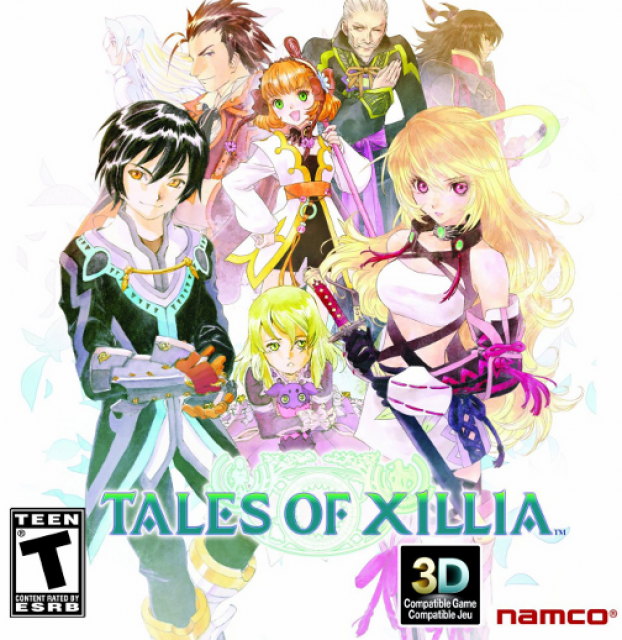Tales of Xillia: A Saga of Integrity Amidst Advancement
On the modern video game message board, few sentences can perhaps be more predictable than ones that contain both "tradition" and "Japanese developed RPGs." What those words mean to you personally and, in turn, whether it's a good or bad thing that they're so regularly paired up is, in this instance, inconsequential; they're so ubiquitous that when those less than gifted in the art of articulation start arguments about the latter, it is all but guaranteed that they cannot be had without an utterance of the former. That much, if nothing else, we can all probably agree upon, yet leave it to Tales of Xillia to throw something of a wrench into all of that. If it's traditional, it's only because it inherits many of the basic mechanics that defined previous Tales entries, designed themselves to be somewhat paradigm-defiant with their real-time action gameplay. But if Xillia isn't traditional, it's because it isn't completely content with maintaining total status quo. Even if the narrative backing it all up doesn't always live up to its end of the bargain, the end result is an intriguing one done largely right, managing to retain what has historically kept Tales games traditionally unique while still unafraid to bring some very appreciable enhancements. [Reviewer's Note: This review covers only the contents of the Japanese edition. A localization has been announced for North America and Europe that is set to be released in 2013 and while in all likelihood the content will remain the same or possibly even enhanced, as has occasionally been the case with Tales games, no guarantees can be made either way.]
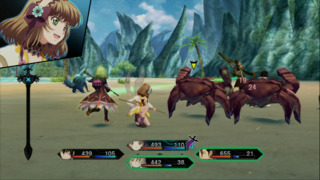
This means that on a functional level, Xillia winds its way through a lot of familiar territory. It's most explicitly true with respect to the battle system, which still takes place in real-time, relies on combo-heavy combat based on moves you can equip and swap out at any time, and still features full battlefield navigation in addition to specific enemy targeting. Likewise, other aspects of Tales-style fighting such as highly adjustable party character AI and an Overlimit meter that can be occasionally triggered to really turn the tide in your favor are also fully intact. Naturally, though, combat specifically isn't the only thing that remains alive and well in Xillia. If you've gotten accustomed to things such as auto-levelling for non-fighting characters, various optional conversations that pepper exploration segments, and dungeon crawling, among numerous other things, chances are pretty good that you'll be able to get up to speed relatively quickly with a lot of Xillia's basic gameplay tropes if you've been keeping up with the series post-Symphonia.
However, it's the things that have been added or changed, both on the periphery and within its mechanics, that makes Xillia shine so much as a Tales entry. Even if much of the foundation belying Xillia's mechanics remains philosophically the same, so many minor and major things are new to this entry specifically that it's apparent the series is thankfully not content to rest on its laurels. Leading this charge is the battle system. While the ally AI customization systems have allowed you to foster some sense of teamwork by letting you tell your companions in somewhat specific terms how you want them to act in various situations, Xillia takes it further by letting you directly team up with other party members now with what's dubbed in the game as "Links." Through Links, when you pick a character to team up with through the D-Pad at any point during battle, they'll orient their actions more directly to what specifically you're doing, as well as how enemies are treating you. For instance, while they'll help out offensively either way, if they notice that you're railing on a particular enemy for a while and racking up large combos, they'll set you up for unique combos by doing things like juggling your target in the air and other such things. They'll also try to position themselves advantageously in relation to how you face your current main enemy so that their blind spots can be hit and, ideally, trigger critical hits that are always welcome. There are also naturally special combo attacks that you can trigger when your Overlimit meter reaches specific notches and when that same meter is full, can be used to actually string multiple combo attacks together. If you're competent enough, you even switch Linked characters on the fly to keep the combo going until the meter runs out. Typically, your linked AI character serves to help you do your job better offensively and since they're still driven by AI protocols of your design, they'll still go off and do other helpful things when the opportunity presents itself.
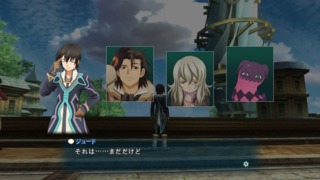
If all they did was help you kill enemies faster, though, then the Link system wouldn't be particularly noteworthy for much anything aside from being a helpful footnote in an already well-developed combat system. The big reason it stands out as a new addition to Xillia is because triggering it also enables the other characters to help you better in more subtle ways. While it begins with them auto-positioning themselves so that a given enemy is being attacked on multiple sides, it hardly stops there. Any character that's linked up to you is also capable of fending off other enemies that might try to butt in on your skirmish and they'll engage them for prolonged periods if necessary so that you can keep doing your thing. If things get especially hairy, though, they'll intervene defensively and attempt to take harsh blows for you by rushing to your side and putting themselves between you and the enemy.
Furthermore, each character you hook up with has their own unique abilities that are triggered during Links. If, for example, you spot enemies that are heavily relying on items to survive, one character is really good at stealing them and adding them to your reserves post-battle, while another character is especially good for defense due to their knack for auto-triggering a magic shield for major spells the enemies will spew. You can even swap out your party members with extreme ease in the middle of battle, should you find yourself in need of somebody with specific abilities at that moment. Linking also enables you to share non-AOE healing spells and buffs with your partner, even if that also comes with the caveat of sharing the occasional status effect, should either of your incur one. When Xillia first introduces the Link system, some of these finer points are initially more difficult to notice than the obvious offensive ones, a consequence of the Tales' series often hectic battles, but as the game moves onward and the difficulty ramps up, their interventions become a lot more obvious and make the system as a whole a highly welcome new gameplay mechanic.
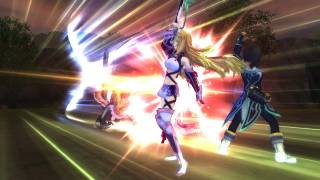
That being said, the ways in which Namco has touched up many of other systems outside of battle are also significant in their own ways and, in some cases, prove to be just as major as the Link system. For starters, the levelling system now enables you to manually control the stat point and skill progression of your individual characters by giving them a few points at each level that can be spent on a grid. Each point on the grid corresponds to a specific stat increase and when you complete entire portions of the grid, that's when additional skills are also unlocked. Given Xillia's length, it's not inconceivable that you'll end up unlocking a lot of the offerings for each character anyway, but the grid is expansive enough such that you can still influence where, when, and how characters grow. You're also able to ask the computer for recommendations on how to progress and can have everyone auto-level with those exact choices, should you not wish to spend so much time fiddling with everybody's levels and want to play the game in a more streamlined manner. It's also possible to do this with each character's set of passive skills based on whether you want them to be more offensive or defensive in battle, or a decent mixture of both.
While the Link system and levelling systems are Xillia's most distinctly new gameplay assets, there are also a lot of smaller features that go far in streamlining the overall experience. These other features largely revolve around the "quick"-centric buzzword that have long defined PC games and that means the game includes things like quick saves, quick restarts for major battles, and quick travelling. They all mostly work as advertised, although it should be noted that while quick saves do save your position and status anywhere in the world, you can only load those saves from the main menu; you're otherwise limited to save point-created save files when loading through the in-game menu. Quick restarts for battling proves to actually be the more important feature in Xillia since not only can you restart failed boss battles and the like within a matter of seconds without reloading a save and going through tedious cutscenes again (all of which, it should be mentioned, can be skipped anyway), but the game actually lets you change out your equipment, attacks, and skills before actually starting the battle again so you can start off on a better foot. As for quick travel, since travel in the game is now done by walking through individual zones rather than just by roaming a large overworld map as in previous games, you're now allowed to warp to any place you've previously visited as long as the plot would allow it. Unless you're doing a lot of the game's side quests, this feature will go largely unused except on the very few occasions you actually need to backtrack, but it's still a nice thing to have for making that process go faster. Complimenting this is an objective notification that you can bring up on the screen at any time that concisely summarizes what exactly the task at hand is and can even be changed out to depict specific side-quest objectives instead. Taken together, these and numerous other minor changes do a lot to make Xillia an RPG whose interface and mechanics are intent on being as unobtrusive on your enjoyment of the gameplay experience as possible. Considering how dense with systems and information Xillia still is, it's nothing short of remarkable that it manages to achieve this feat.
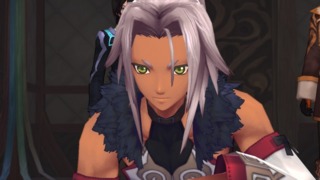
In the midst of all of this renovation, it's a disappointment to see that the same level of attention wasn't given to making Xillia's plot feel particularly refreshing. Taking place in a world where humans and spirits coexist in a mutually beneficial relationship, the game focuses on the travels of Jude, a 15 year-old medical student unsure of what to do with himself, and Milla, a confident guardian spirit of sorts intent on preventing the overall world balances don't go out of whack who also happens to take the form of a 20 year-old girl. Their main objective is the destruction of a super-weapon dubbed the "Spear of Kresnik," capable of absorbing the world's spirits and the mana that holds everything together in the first place. Along the way, Jude and Milla naturally accrue a party that eventually grows into six people, all of whom have their own secrets and motivations for tagging along with the pair as they do their work.
On its own, Xilla's plot is perfectly serviceable and does a good enough job pushing you along from one setting to the next, but nearly all of the specifics so greatly resemble past Tales games that hardly any of the story will likely prove to be surprising to series aficionados. Anybody familiar with how the series has typically portrayed the various character tropes will be able to more or less know from the second they meet them how their basic arc will pan out and, in turn, what level of importance they'll really have in how things end. That's not to say that parts of the story aren't without their high notes; like most Tales games, Xillia's biggest narrative strength is still in character dynamics and despite the fact that the cast itself might not be particularly original, the party members do bounce off each other well and have a decent number of entertaining moments. There are some characters whose motivations and antics, as well as the cast's general reactions to them, become increasingly questionable as the game moves forward, but at a fundamental level, Xillia's characterizations are typically serviceable. It's just unfortunate to see a game that otherwise does so well at introducing change in the exact places it's necessary without losing the Tales identity that the narrative is so stagnant and comes off as the most traditional part of the entire package.

That being said, Xillia doesn't completely lack an experimental spirit with its storyline. Even on that front, Namco has seen fit to try and change things up by allowing you to "pick" either Jude or Milla as the protagonist. I say that in quotation marks because the actual effects that the decision has on the gameplay and story experiences are pretty minor in comparison to what that sort of decision normally implies. While the box and game itself are keen on having you believe that your choice will grant you drastically different insights into the same overarching plot, the reality of it is much smaller in scope. Since both Jude and Milla spend the majority of the game's plotline together, you're largely seeing things unfold the same way no matter what, with the choice only really coming into play on the rare occasion when the two actually split up for an extended stretch. During those instances, you'll only see what happens from your chosen character's perspective, but beyond that, there's no real tangible impact to be felt in who you choose. The choice doesn't even usually affect who you can play as in battle since, like with other Tales game, you can choose to play as whoever you wish to fight so long as the plot allows for their presence. This means that not only can you choose to main Jude in what's supposed to be Milla's story or vice versa, but also any of the other supporting cast who tag along with you for the journey. From a gameplay perspective, this is obviously fine and a feature that's otherwise completely appreciated, but it's still worth noting in this context since it can further lessen the impact that your choice in protagonist actually has on the game as a whole.
Much more egregious from a design perspective, however, is how the story is treated due to this split. While it's true that the specifics of the plot largely stay the same regardless of who you pick, the structure is imbalanced such that the beginning of the game can either be coherent or an utter mess depending on your initial decision. Should you pick Jude as your protagonist, the game will spend a good amount of time properly building up the general world and lore, enabling you to slowly acclimate to Xillia's inner-workings and, in turn, provide character motivations for their actions. Milla's beginning is completely lacking in this and instead of providing a unique prologue of her own that properly sets things up for her storyline, it begins by simply dumping her an hour or two into the midst of Jude's at the point where they meet. The result of this is an opening segment that feels rushed and filled with a lot of very presumptuous references that the game doesn't go out of its way to explain since no changes are made from Jude's storyline about how the proceedings are presented.

These problems would largely be moot if Milla's storyline had been locked until completing the game as Jude, but the fact that you can actually pick to play as her first before Jude and that her story still makes the assumption that everybody already knows the basics of Xillia's world anyway is a big problem. Players who start the game not knowing about this are essentially making a big gamble that will greatly affect how understandable the opening segments will be. Either they get Jude and they're steadily introduced to the game's setting without feeling lost or they get Milla and receive virtually none of that. If it's the latter, one can easily get the impression that Xilla's plot is much messier than it ultimately is or, at the very least, should be. The disparity is so extreme in the opening segments that playing Jude's part first will ironically yield a better initial understanding of Milla's character and her drive than picking Milla herself. Xillia is so long that you'll spend plenty of time getting to better know the cast and what's going on in the larger scheme of things either way, so while it's not conceivably impossible to get up to speed should one pick Milla, the game still expects you to know too much about what already happens in advance to make picking her a sound choice despite having her readily available from the get-go.
That being said, those problems aren't enough to derail all of the things Xilla still manages to achieve overall as a Tales game. This extends into the artistic realm as well. Although the game's music and sound design are serviceable enough, it's Xillia's visuals that are the noteworthy portion. Employing a cel-shaded aesthetic style with a bit of a deliberately rougher look compared to most of the cleaner-looking implementations like in Tales of Vesperia, the game is typically quite pleasing to view. It's one of those games where, on a technical level, you can find some things to nitpick here and there when things are still, but since Xillia is always concerned about moving you forward, those chances don't come often. The character's facial expressions in particular are really well-done, exhibiting an emotional range and level of nuance not seen since last year's Catherine. Those animations alone go a long way towards bringing life into a cast that otherwise might not always be the most engaging that the Tales series has ever produced.
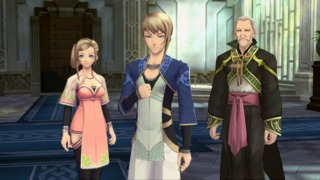
Overall, the only major knock to be had against Xillia's graphics lies in its frame rate. While it's often extremely stable both inside and out of battle, there are a few stretches of the game where things such as a large number of projectiles can very visibly drag the tempo. It's hard to know for certain how much of a hit the frame rate takes in those instances without proper equipment, but it felt like the battles were going a half to a quarter of the speed at which they normally flow. The frame rate improves once those enemies disappear and thankfully the number of times you'll likely encounter those sorts of fights can be counted on one hand, but it's still unfortunate that the drops happen in the first place, especially considering that underlying technology admirably handles other types of intensive scenes in the game with ease.
It's easy to say on a fundamental level that Xillia is a textbook Tales experience. Your understanding of how a Tales-style battle is conducted will not change that dramatically, nor will that be the case with how you approach character growth and, likewise, how the game and its characters generally conduct themselves. The fact that these systems still function well and are fun to play largely as they are is a testament to how solid the foundation is, but it's the way in which Namco still went beyond that and refined a lot of the basic systems that ultimately ensures Xillia is still a progressive game. There's still room for improvement, especially in how having the dual protagonists should have been handled, yet Xillia does so much right as both a Tales entry and an action RPG in general that there's no need to be so cautious about it. If nothing else, it does an admirable job continuing its franchises' largely single-handed effort of reminding one that sticking the two words "Japanese" and "RPG" together do not inherently equal the manifestation of just one sort of gameplay paradigm. For the sake of all those message board debates, that can only be a good thing.
